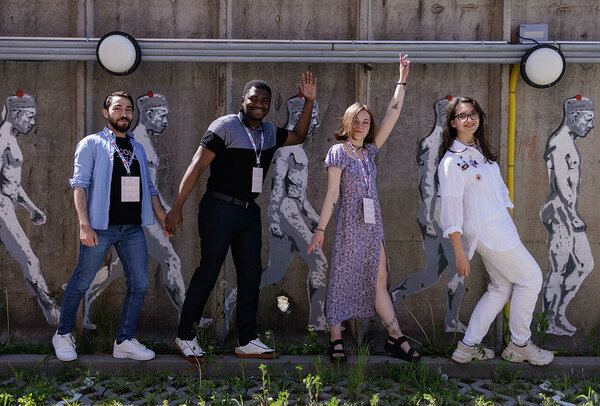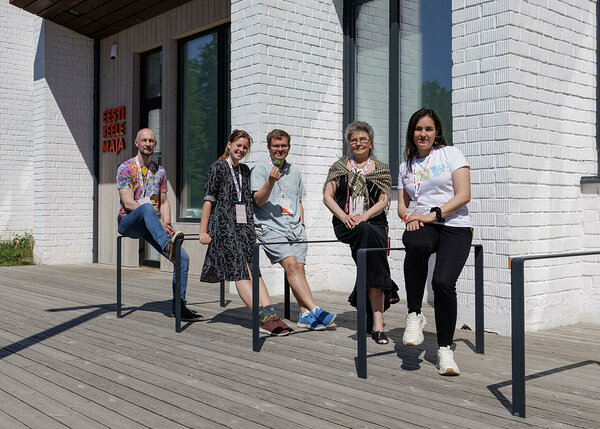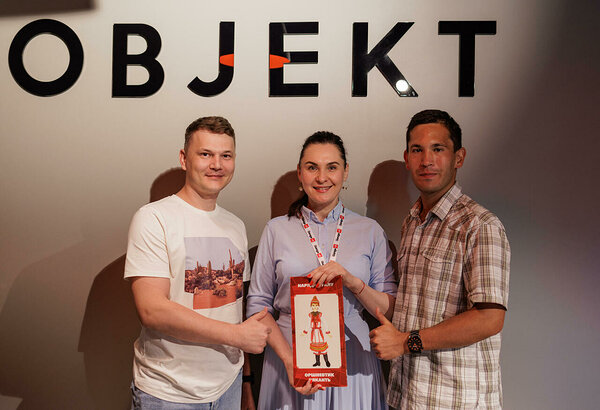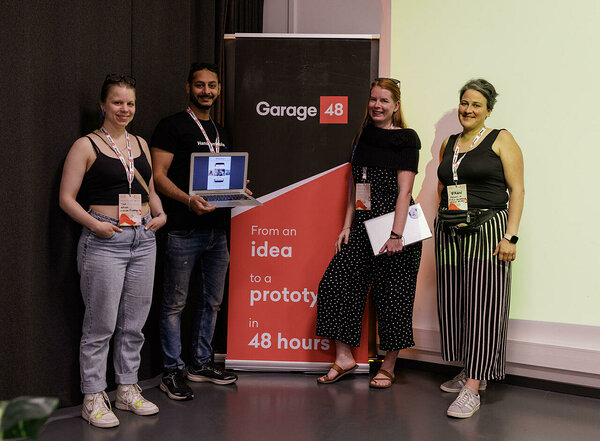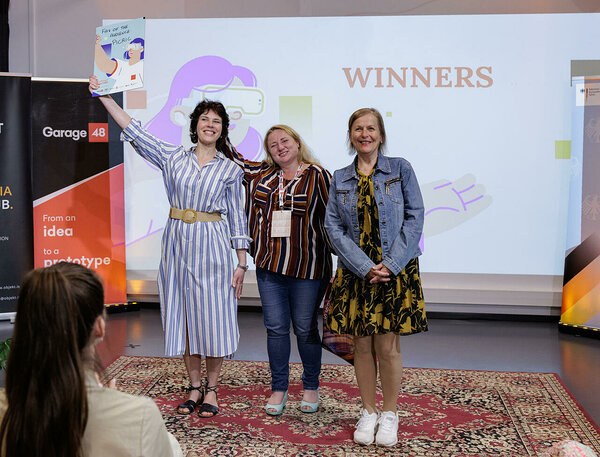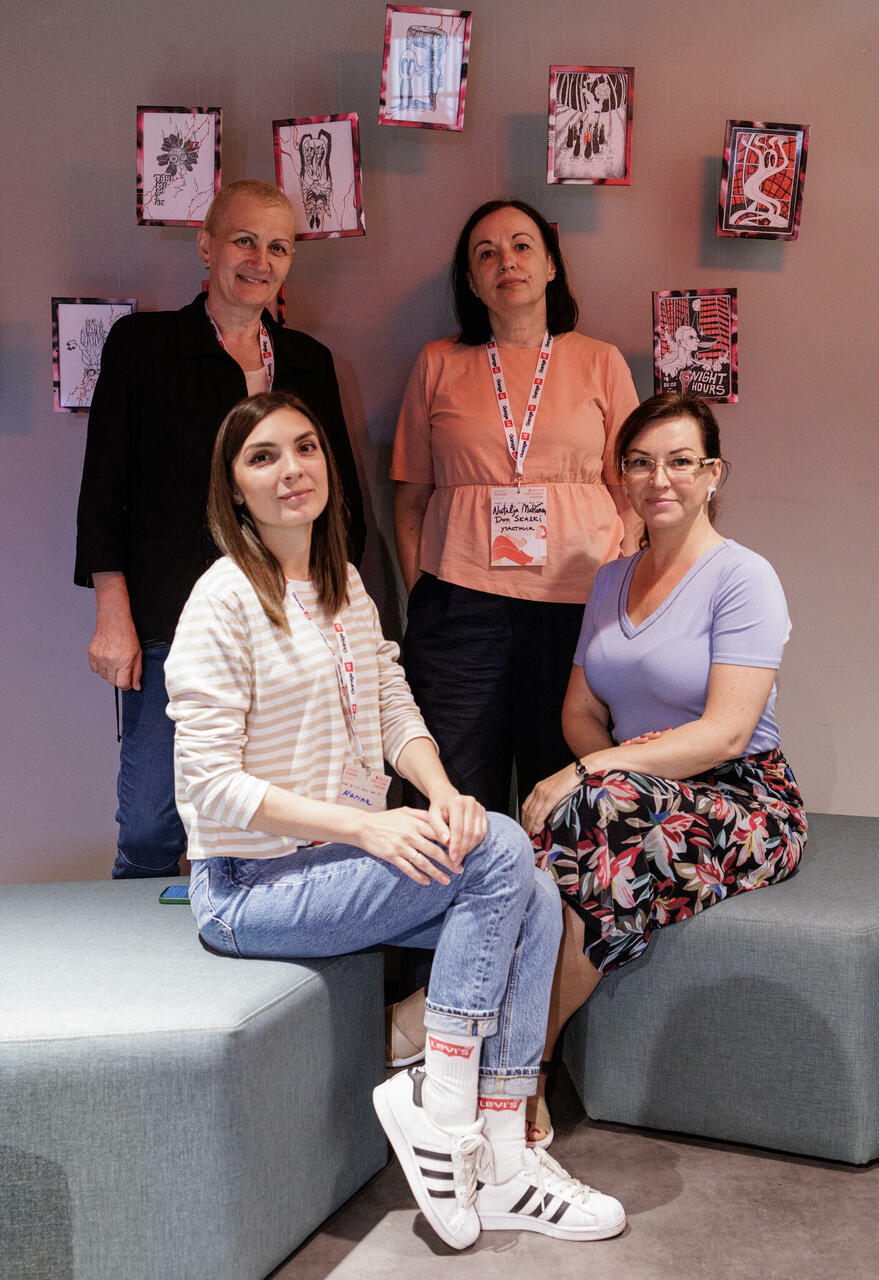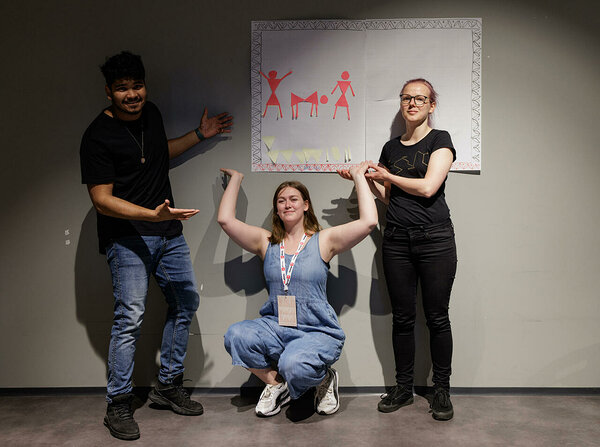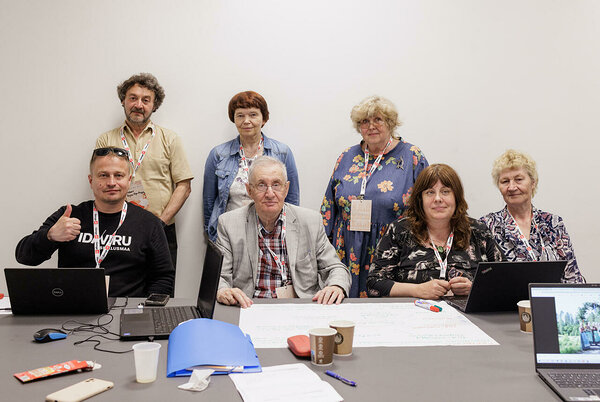Estonia is home to over 200 ethnic minorities, each with its own unique traditions and heritage that deserve to be showcased and passed on to future generations. It’s well known that cultural diversity enriches us by broadening our horizons, teaching us new ways of thinking, giving us a more interesting place to live in, and increasing tolerance. The hackathon aimed to foster collaboration between these different nationalities and build tech solutions to raise social awareness and interest in the importance of cultural heritage and its preservation, especially among the younger generations.
The Ministry of Culture of Estonia started its digitalization process in cultural spheres a few years ago. We have developed platforms like Jupiter for movies, offered digital Estonian language learning opportunities, and developed client management systems to make data collecting and registration for different services more suitable for public officials and immigrants. When it came to the digitalization of national minorities, we went to their associations and asked them what they needed. They said that they need more visibility in Estonian culture, more opportunities to pass on their national heritage, and ways to bring in more youth to their activities.
- Krismar Rosin, advisor of the Ministry of Culture of Estonia
To meet those needs, the Ministry of Culture brought to life Culture Digihack. Representatives of 18 ethnic minorities took part: Ukrainian, Jewish, Russian, Bashkir, Ersa, Udmurt, Estonian Swede, Latvian, Belorussian, Finnish, Guinean, Syrian, Indian, Pakistani, Chilean, Nigerian, Turkish, Peruvian, and Estonian. All age groups were also represented, with the youngest participants just 18 years old and the oldest 75+. We were delighted to see discussions about cultural diversity throughout the weekend, which led to new ideas not only during the hackathon but for the future as well.
I got the biggest incentive to act from an evening discussion with my roommates at the hotel. We got the idea to try to create an area with geographical borders to mark where Estonian Swedes lived. They called their home AIBOLAND. Our thought development led us to Aiboland “money”, which could be bought at ten Aiboland cultural centers and the purchase of every coin would contribute to the development of the area. We got initial careful optimism towards the idea from the Aibolands Museum board, but let’s see!
- Toivo Tomingas, Video Piano Team Lead
At the finals, we heard a wide variety of ideas pitched. These were not only diverse in the cultural heritage sense, but also in the way they approached the tech aspect. Some built websites, others created mobile games, and one team managed to create a functioning prototype of an AR mobile app. The opportunities really were endless.
Meet the winners:
OVERALL WINNERS: Vyshyvay
In Ukrainian embroidery, every symbol has a meaning. Unfortunately, not everyone knows what they are and even fewer know how to embroider themselves. Vyshyvay is a platform where you can learn about and design patterns using traditional and contemporary embroidered Ukrainian national motifs (vyshyvankas). On the platform, you can also learn to embroider yourself, design a pattern for a shirt, and order a personalized embroidered shirt from a Ukrainian embroiderer.
They won project support in the value of 2000€ from the German Embassy in Tallinn to develop their idea further and will be invited to a reception at the French Institute. The team hopes to have the platform running in July for anyone who wants to start ordering their vyshyvankas.
Team Vyshyvay
Team members: Alina, Oksana, Famoro and Ghieth
First runner-up: KultuuriAmps
KultuuriAmps (“Bite of Culture” in Estonian) is a platform for web exhibits. All content will be presented in short form “bites”, which make information easily digestible for the readers.
We came to the hackathon to search for a challenge, new acquaintances, and interesting discussions about culture. Narva was a great place for an event like this. We’re going full steam ahead with KultuuriAmps and expect to bring the first "bites" to people in the fall.
- Kaidi Kütt, KultuuriAmps team member
They won 1000€ from the Integration Foundation to develop their idea further.
Team KultuuriAmps
Team members: Kaidi, Rasmus, Berta, Egon and Pille.
Second runner-up: Who Are We?
Who Are We? is an educational mobile game to introduce the heritage and language of minorities' cultures. In the game, the user goes through a journey as a representative of a national minority. Along the way, they unlock items such as national clothing, food, sayings, etc, and learn about them as they go.
I represent Bashkirs. I feel satisfied with and proud of everything we achieved. Every Garage48 event I’ve taken part in has put me to the test in new ways and this time was no exception. I was made a team lead. I’m a shy person and I’ve had little experience with public speaking. I’m proud of myself for not fainting during the pitch and for getting all the words out in the right order.”
- Ilnur Hairullin, Who Are We? team lead
I represent the Erzyas people and came to the hackathon to gain new knowledge and experience. I got a lot of positive emotions and wish to bring our project “Who Are We?” to life to inspire children to learn about their roots and be more knowledgeable about Estonian minorities
- Natalia Ermakov, Who Are We? team member
Team Who Are We?
They won 1000€ from the Ministry of Culture to develop their idea further.
Team members: Natalia (Erzya), Sergei (Udmurt) and Ilnur (Bashkir)
Special prize from the Ministry of Culture: Hoplocal
Hoplocal is a marketplace that connects people through local hobbies and experiences. In addition to learning new skills, it’s an opportunity for tourists or expats to learn local traditions and get acquainted with local communities.
Check out the activities on offer: https://hoplocal.co/
Our team was composed of an Indian, Estonians, and Chilean. As our project aligned directly with the theme of the hackathon, we wanted to take the opportunity to develop it further and share it with the others. It was indeed a great platform to present our project to the audience and get their feedback. We are developing the project further at full throttle and making a public launch in the first week of July.
- Parmeet Sawhney, Hoplocal team lead
They won 1000€ from the Ministry of Culture to develop their idea further.
Team Hoplocal
Team members: Tiina, Marju, Fran and Parmeet
PS! They are looking for some amazing talents to join the founding team!
Favourite of the audience: Picric
After testing the idea on their children when they were in school, Ruslan and Lena came to the hackathon to build a platform that uses illustrations to make learning poetry easier.
I realized that at any age you can move forward and grow, and now I want to take part in hackathons again. I have new cool ideas. But there is not enough knowledge and skills to work with computer programs. I want to acquire knowledge in this direction. And I want a good team. Yes, I had a good time and discovered a lot of new things for myself! The reviews are the best. Thank you all!
- Jelena Sarina, Picric team member
Team PicRic at the award ceremony
Team members: Ruslan, Lena, Polina, Lena and Lena
Vabamu prize: Dom Skazki
Dom Skazki (“fairytale house” in Russian) is a website where you can find fairytales from different countries. By comparing how different nations talk about good and evil, nature and animals, birth and death, we get a unique understanding of the beliefs of people in different parts of the world.
During the hackathon, they built a website and added the first two fairytales: https://domskazki.ee/
We discovered a new format for ourselves at the hackathon. We were able to analyze our capabilities, interests, and plans. We were very happy with the result and not only plan to continue our project, but also expand it into different languages and countries. We have a plan for the next seven years!
- Marina Tee, Dom Skazki team member
Their project will be featured on the Vabamu NoVa platform.
Team Dom Skazki
Team members: Marina, Natalja, Danuta and Marina
Special mentions:
For the use of tech: wARli
Warli is the art of a tribe in India that dates back more than 1000 years. It uses basic geometric shapes to create characters and storylines. Team wARli created an interactive Augmented Reality experience where people can create their own Warli artwork and learn about the culture while doing so. In the future, a similar approach can be created using patterns and symbols of other cultures as well.
They won annual passes to all of the 7 facilities of the Tallinn City museum.
Team wARli in front of a drawn Warli pattern
Team members: Toshi, Helena, Anni
For out-of-the-box thinking: Tastes of Ida-Virumaa
There are many recipe books for Ida-Viru dishes, but so far, they haven’t been properly digitized. Team Tastes of Ida-Virumaa came together to build a website that increases the awareness of traditional food and preserves its heritage. They believe that national food brings people together, so it deserves to be showcased!
This team was initially skeptical about participating because they didn’t think they had the tech skills to create their website in the way they wanted. After some tech mentoring, encouragement, and some help, the team managed to put together a WordPress site featuring recipes, a selection of authentic restaurants and information about available cooking classes.
Team Tastes of Ida-Virumaa with mentor Meelis Kuusk
Team members: Aleksander, Malle, Maire, Natalja, Iahov, Jana aka JAN2MI
If you want to see more of the Culture Digihack:
👉🏻 Check out the whole photo album.
👉🏻 See all the teams in the Favorite of the Audience photo album.
👉🏻 Rewatch the finals.
The hackathon was funded by the Estonian Ministry of Culture. This project is carried out in cooperation with the British Council in Estonia as part of the People to People Cultural Engagement Programme. Find more info about British Council’s work in Estonia at www.britishcouncil.ee
